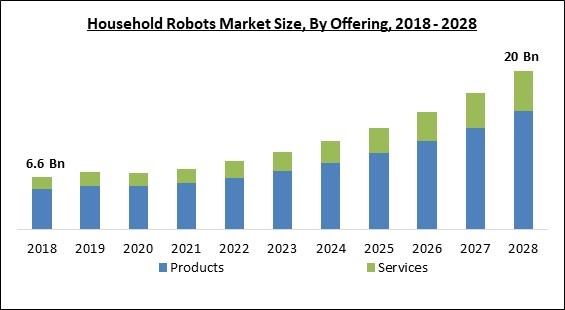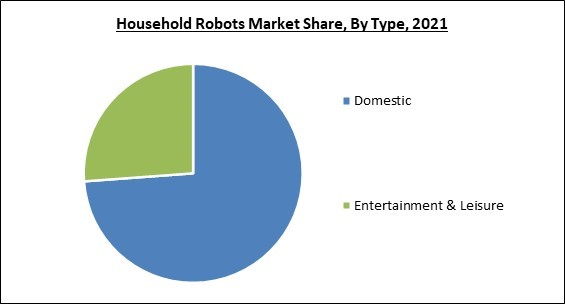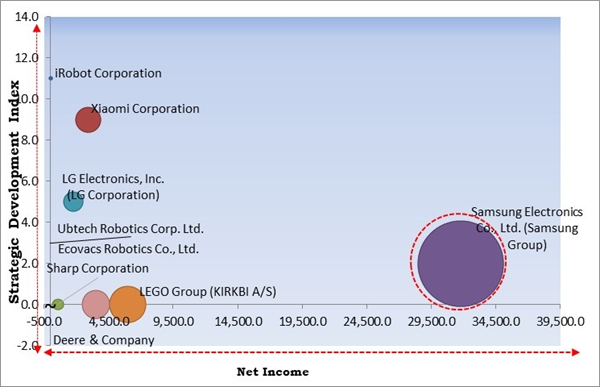A robot may look intelligent or have thoughts of its own by emulating a human appearance or automating motions. Future predictions predict a proliferation of autonomous objects, with home robotics and the automated robot serving as some of the primary propellants. An automation system that is mainly used for home tasks but may also be utilized for treatment, education, and entertainment are known as a household robot.
While most home robots are basic, some are highly autonomous and connected to Wi-Fi home networks or smart surroundings. A robotic leaf blower is one that, once programmed, can cut the grass on its own. This device continues the process on its own after it has been programmed. Robotic lawnmowers have a power source, which might be an internal combustion engine or an electric motor.
The robot is given power enabling it to move both itself and its cutting blades. The mower is also assisted in moving by a control device. This device also has a memory module that stores and retains the operating programming. It has memorized the distance traveled in each direction as well as the degrees of turns. As a result, it is possible to continually mow the same lawn without having to reload.
COVID-19 Impact Analysis
The COVID-19 pandemic is a worldwide health disaster that has harmed every industry. Governments all across the world have implemented stringent lockdowns and travel restrictions to contain the COVID19 pandemic outbreak. Due to the COVID-19 pandemic, government administrations ordered businesses to operate with limited staff and adhere to tight social distance standards, which caused businesses' output rates to fall. Therefore, the market expansion of the home robot had been adversely impacted by all of these problems.Market Growth Factors:
Rising Interest in Autonomous Robots
Numerous businesses are utilizing automation technology, such as app integration and intelligent navigation, to lessen human interaction and provide a smooth experience for their clients. For instance, the earliest robotic vacuum product offers required human power on and charging. The places inside a house were not equally covered by its ineffective navigation system. The navigation algorithms in the new systems are more effective, though.A Greater Level of Batteries Is Achieved by The Robots
Robotics might benefit greatly from increasing their endurance capacity, which would enable them to cover a greater region and be more serviceable. When completely charged, these robots can now function for a short time - between one and two hours - before returning to a charging point to refuel for more operations. These robots are now powered by NiMH batteries to save expenses. Every smartphone uses the well-known Li-ion battery, which has several advantages while retaining the same amount of power.Marketing Restraining Factor:
Regulations for Data Protection and Legal Safety
Due to the fast-growing robotics sector, families all around the world have incorporated robots into their homes. Robotic equipment helps to simplify irksome tasks like vacuuming, gutter cleaning, lawn mowing, and ironing. Home robots may now assist with tasks such as waking up, engaging with family members, and defending property in addition to domestic chores. However, despite the potential benefits of domestic robots, a lively debate regarding the security and privacy dangers connected with their use has gained public attention.Offering Outlook
Based on the Offering, the Household Robots Market is segmented into Products and Services. The service segment witnessed a significant revenue share in the household robots’ market in 2021. The most recent technical developments in the fields of robot systems, handling, guidance, object identification, and human-robot interaction are included in the book Household Service Robotics.Type Outlook
On the basis of Type, the Household Robots Market is divided into domestic, Entertainment, and Leisure. The entertainment & leisure segment recorded a substantial revenue share in the household robots’ market in 2021. It is because robots are being used in the entertainment sector for the same rationale that manufacturers do: accurate, repeatable, uninterrupted labor. A variety of entertainment applications can benefit from collaborative robots due to these characteristics.Distribution Channel Outlook
By Distribution Channel, the Household Robots Market is classified into Online and Offline. The offline segment registered a significant revenue share in the household robots’ market in 2021. The development of e-commerce, which increased demand for robotic vacuums, is responsible for the expansion. The e-commerce industry is expanding dramatically in nations, which is improving the prognosis for the market. Additionally, alluring deals and discounts offered by online retailers like Walmart and eBay on robots will fuel the market's expansion.Application Outlook
Based on the Application, the Household Robots Market is bifurcated into Vacuuming, Lawn Mowing, Pool Cleaning, Companionship, Elderly Assistance, and Handicap Assistance, Robot Toys and Hobby Systems, and Others. The vacuuming segment acquired the largest revenue share in the household robots’ market in 2021. Most people now recognize the necessity for household cleaning products of the highest quality. Cleaning robots, in particular, provide the advantages of contactless and smart cleaning as compared to manual services, offering a strategic potential development for the house cleaning robot industry.Regional Outlook
Region-wise, the Household Robots Market is analyzed across North America, Europe, Asia Pacific, and LAMEA. The North America segment procured a significant revenue share in the household robots’ market in 2021. It is due to the prevalence and sales of robotic lawnmowers and vacuums in the US and Canada that are mostly blamed for this. Every day, robots perform many tasks for humans. Robots are progressively taking on the responsibilities of boring, filthy, or hazardous activities at home, at work, and on the battlefield.Cardinal Matrix-Household Robots Market Competition Analysis
The major strategies followed by the market participants are Product Launches. Based on the Analysis presented in the Cardinal matrix; Samsung Electronics Co., Ltd. (Samsung Group) is the forerunner in the Household Robots Market. Companies such as Xiaomi Corporation, iRobot Corporation, LG Electronics, Inc. (LG Corporation) are some of the key innovators in Household Robots Market.
The market research report covers the analysis of key stake holders of the market. Key companies profiled in the report include Samsung Electronics Co., Ltd. (Samsung Group), LG Electronics, Inc. (LG Corporation), iRobot Corporation (Amazon.com, Inc.), Xiaomi Corporation, Ecovacs Robotics Co., Ltd., Deere & Company, Dyson Limited, LEGO Group (KIRKBI A/S), Sharp Corporation and Ubtech Robotics Corp. Ltd.
Strategies deployed in Household Robots Market
Partnership, Collaboration and Agreement:
- Apr-2022: Samsung Electronics formed a partnership with ABB, a multinational corporation. This partnership aimed to expand Samsung SmartThings integration into more homes and buildings.
- Aug-2021: LG Electronics collaborated with Hyundai Elevator, a joint venture between Hyundai Heavy Industries and Westinghouse Elevator. This collaboration aimed to create robot logistics services in which autonomous bots provide parcels and food at office buildings, apartments, and hospitals with elevators.
- Jan-2020: iRobot came into a partnership with IFTTT, the leading integration and discovery platform. This partnership aimed for IFTTT to open up exciting new automation, which would improve iRobot's prevailing connected product base, elevate the customer experience and further differentiate the products in the marketplace.
Product Launches and Product Expansions:
- Sep-2022: iRobot Corp. released the Roomba Combo j7+, the world's most advanced robot vacuum, and mop, with thoughtful iRobot OS 5.0 updates. The Roomba Combo j7+ would complement iRobot OS intelligence with smartly developed hardware to provide customers a vacuum and mop solution, rugs, and hard floors cleaner, capable of keeping carpet, and fresher every day, so users can live their life.
- Aug-2022: Xiaomi expanded its product portfolio with the release of the Robot Vacuum Mop 2 Pro vacuum cleaner. The latest vacuum mop is developed with microfibers and would evenly distribute water and dry the floor quickly.
- Aug-2022: Xiaomi Corporation launched a full-sized humanoid robot named CyberOne. This robot has 21 degrees of freedom in motion with a real-time response speed of 0.5ms for each degree, enabling it to simply simulate human movements.
- Jul-2022: Xiaomi introduced the ‘Cyberdog’, a robotic quadruped resembling an actual dog. The CyberDog is developed with 11 sensors, which would offer instant feedback to guide its movements which made it the perfect partner for assisted living.
- Jan-2022: LG Business Solutions USA launched the LG CLOi ServeBot to the U.S. Model LDLIM21. This robot is the world's first commercial service robot holding UL 3300 certification for safe operation in complicated commercial surroundings like retail stores restaurants, and hotels.
- Sep-2021: iRobot Corp. unveiled the Roomba j7+ robot vacuum and new features powered by iRobot Genius 3.0 Home Intelligence. This robot delivers better levels of customization, new home automation, and the capability to become smarter over time, enabling the robot to provide a more intuitive cleaning experience so customers have more time to do what's most important to them.
- Aug-2021: UBTECH Robotics unveiled Walker X, the latest version of its groundbreaking bipedal humanoid robot. This robot has been upgraded to carry out a broader variety of household tasks that includes pouring liquids, wiping surfaces, serving tea, watering the flowers, and operating the vacuum cleaner.
- Aug-2020: iRobot introduced a new robot platform called iRobot Genius Home Intelligence. This platform is available for the Braava jet robot mop, Roomba robot vacuum, and other Wi-Fi-connected products of iRobot.
Scope of the Study
Market Segments Covered in the Report:
By Offering
- Products
- Services
By Type
- Domestic
- Entertainment & Leisure
By Distribution Channel
- Online
- Offline
By Application
- Vacuuming
- Lawn Mowing
- Pool Cleaning
- Companionship
- Elderly Assistance & Handicap Assistance
- Robot Toys & Hobby Systems
- Others
By Geography
- North America
- US
- Canada
- Mexico
- Rest of North America
- Europe
- Germany
- UK
- France
- Russia
- Spain
- Italy
- Rest of Europe
- Asia Pacific
- China
- Japan
- India
- South Korea
- Singapore
- Malaysia
- Rest of Asia Pacific
- LAMEA
- Brazil
- Argentina
- UAE
- Saudi Arabia
- South Africa
- Nigeria
- Rest of LAMEA
Key Market Players
List of Companies Profiled in the Report:
- Samsung Electronics Co., Ltd. (Samsung Group)
- LG Electronics, Inc. (LG Corporation)
- iRobot Corporation (Amazon.com, Inc.)
- Xiaomi Corporation
- Ecovacs Robotics Co., Ltd.
- Deere & Company
- Dyson Limited
- LEGO Group (KIRKBI A/S)
- Sharp Corporation
- Ubtech Robotics Corp. Ltd.
Unique Offerings from the Publisher
- Exhaustive coverage
- The highest number of market tables and figures
- Subscription-based model available
- Guaranteed best price
- Assured post sales research support with 10% customization free
Table of Contents
Companies Mentioned
- Samsung Electronics Co., Ltd. (Samsung Group)
- LG Electronics, Inc. (LG Corporation)
- iRobot Corporation (Amazon.com, Inc.)
- Xiaomi Corporation
- Ecovacs Robotics Co., Ltd.
- Deere & Company
- Dyson Limited
- LEGO Group (KIRKBI A/S)
- Sharp Corporation
- Ubtech Robotics Corp. Ltd.











